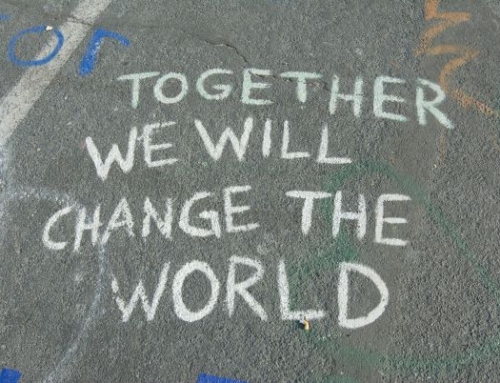Discovering boundaries and how to apply them in a healthy way

Photo by Marek Studzinski on Unsplash
Boundaries, as a term, is a therapy buzzword that has dominated pop culture as of late. This is partly due to recent events in celebrity news. In the summer of 2023, professional surfer Sarah Brady posted alleged text messages between herself and Jonah Hill. In the alleged texts, Hill listed his “boundaries” for a romantic partnership. There were mixed reactions to this story, however, with some saying that therapy-speak can be weaponized to control others by misusing this language to manipulate others.
So, what are boundaries anyway?
Boundaries defined
In relationships, boundaries are limits set in place for self-protection. They identify how you would like to be treated by others and what you need in order to feel comfortable. If you grew up in a household with a lack of boundaries, you may believe that they keep people out or are somehow a sign of rejection. This is sometimes true, but that isn’t necessarily a bad thing.
In many cases, however, boundaries help keep people in relationships. It can be one way of saying “Hey, I really want to be close with you, and here’s what I would need in order to feel comfortable, safe, and willing to do so.” In this sense, having limits can prevent resentments, burn-out, and feelings of being taken advantage of.
The truth is expectations around boundaries already exist in every relationship, they just might not be obvious. If you’re not careful, you might be setting an expectation for others that you are, for instance, always available to help with a task no matter how busy or stressed you are. You might find yourself increasingly frustrated at others never respecting your time or how much you’re struggling. But… how often have you actually expressed this and said “No”?
How to effectively set boundaries
If setting out to implement limits with others feels daunting, it may be helpful to think of this process as discovering your existing limits within yourself, and honestly communicating them to others. Expressing the parameters to what you are or aren’t capable of or willing to do without hurting yourself not only prevents resentment, but it also gives you more energy to devote to your relationships at other times. It also gives another person the opportunity to understand your wants and needs (which is the first step in getting your wants and needs actually met!).
Become aware of your emotions and what they feel like in your body.
Let’s use anger for example. You may notice that when you feel angry, your shoulders or muscles are tense, you feel hot, or there’s a lump in your throat. Or, you might experience this in the reverse: you may notice your fists are clenched and your brow is furrowed. By understanding your physical reactions to anger, you can be more aware of what you’re feeling in the future.
Name it.
After identifying the emotional sensation and linking it to a body sensation, identify what the actual emotion is. I am feeling angry right now. Having words for your feelings allows to better communicate with others and also to figure out the need behind the emotion.
Be curious.
Instead of judging the emotion, feeling shame, or pushing it aside, try to actually understand why you are feeling this way. Why am I feeling angry right now? Asking this question can help you identify what external and/or interpersonal behavior led to the anger.
For example, maybe you feel angry because you’re feeling overwhelmed and your partner asks you to spend some time talking with them. This can feel infuriating because you just don’t have the time or mental capacity. But, do they know this? Even if they do, does that mean they should ignore their own needs for communication and connection?
Boundaries are about letting someone know what your wants and needs are. For sure, you cannot expect someone else to read your mind or know what you need if you haven’t expressed it. However, it may not necessarily be that person’s responsibility to meet those wants/needs. Or, they may not be willing or able to. Often, needs and boundaries conflict.
Boundaries are not demands. Boundaries are not about some universal right or wrong. They are simply about one person’s needs and limits.
As an adult, it is your responsibility to regulate your anger and to learn to compromise. The same is true for any other emotion. (The good news is the reverse is also true as well- it is not your responsibility to manage your partner’s emotions!).
Take Action
Oftentimes, you can respect and compromise around your sense of overwhelm and your partner’s need for connection: You may find that simply naming it and talking it through with your partner is an effective way to alleviate your concerns. You might want to set limits on how long you can offer to talk with your partner in that moment, or ask to set a time later when you have more capacity.
You might also need a therapist’s help in the long-run to learn communication skills and to manage expectations, as some of your boundaries, anger, and/or limitations may be more about the past than the present. In therapy, you may unearth a history of interpersonal patterning that contributes to similar patterns in multiple relationships. Working through the historical hurt might be the most appropriate way to alleviate your anger, rather than looking to a partner or friend to resolve long-term hurts, and this might take some time.
In sum, boundaries are about you and your limits, and never about controlling another person’s actions.
Here are some more examples of boundaries:
- I have another obligation and can only stay for one hour.
- I really care about you and want to support you, but I am busy at the moment. Can we set up a time really soon to connect?
- I will not stay in this room if you continue to call me names.
Applying boundaries in real life
As you start to implement boundaries, especially in your longer-term relationships, don’t be surprised if you receive mixed reactions from others. Many of your closest friends, family, and partners won’t expect this new form of communication. People may respond with anger, confusion, surprise, and/or defensiveness.
Remember, sometimes for some people boundaries may be perceived as rejection. But, also remember that it is no more your responsibility to manage others’ emotions than it is theirs to manage yours.
You may also feel uncomfortable due to trying something new, prioritizing yourself and your needs over others’, and/or going against a cultural norm. Your communication of limits and needs likely won’t be very skilled at first either. That’s ok. Any change can be a bit messy at first – it’s still worth the change!









